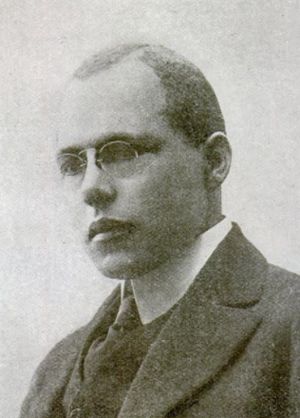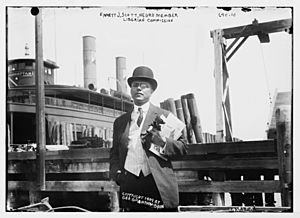Emmett Jay Scott facts for kids
Quick facts for kids
Emmett Jay Scott
|
|
|---|---|
 |
|
| Born | February 13, 1873 |
| Died | December 12, 1957 (aged 84) |
| Occupation | Political advisor, educator, publicist |
Emmett Jay Scott (born February 13, 1873 – died December 12, 1957) was an important American journalist, writer, and government official. He was a close advisor to Booker T. Washington at the Tuskegee Institute. Scott helped Washington build a strong national network of Black business leaders, wealthy white supporters, and Republican politicians. Later, he became the highest-ranking African-American in President Woodrow Wilson's government.
Contents
Emmett Jay Scott's Story
Early Life and Education
Emmett Jay Scott was born in Houston, Texas, in 1873. His parents, Horace Lacy Scott and Emma Kyle, had been enslaved. He started studying at Wiley College in 1887. However, he left college three years later to begin a career in journalism.
Starting a Journalism Career
Scott first worked as a janitor at The Houston Post, a newspaper owned by white people. He then became a messenger and later a reporter. Scott and his friends felt that the African-American community in Houston was not getting enough news coverage.
So, Scott joined Charles N. Love and Jack Tibbitto to start Houston's first African-American newspaper, the Texas Freeman. Scott soon became the editor. Under his leadership, the Texas Freeman grew and became a very important newspaper across Texas.
Working with Booker T. Washington
While in Houston, Scott supported Booker T. Washington, who was building the Tuskegee Institute. Washington was impressed by Scott's work. In 1897, Washington hired Scott to be his main helper and advisor. Scott played a big part in running the college, raising money, and creating Washington's national network of Black business owners and white supporters. He was even called the "Architect of the Tuskegee Machine" because he helped build this strong network.
Scott also invested in real estate and had connections in banking and insurance. In 1900, he helped start the National Negro Business League, a group for Black business owners. He served as the Secretary of this organization until 1922.
In 1909, President William Howard Taft chose Scott as one of three American representatives to Liberia.
Scott served as the Secretary of the Tuskegee Institute from 1912 to 1917. He was also chosen as Secretary for the International Congress of the Negro, a big meeting held at Tuskegee Institute in 1912. After Washington died in 1915, many expected Scott to become the new head of Tuskegee. However, the trustees chose Robert Russa Moton instead.
Journey to Liberia
Scott was part of a group sent to Liberia by the U.S. government. He worked with Booker T. Washington on this project. When Washington realized the trip would take too long, Scott took his place and went to Liberia.
Role During World War I
As the United States prepared for World War I, President Woodrow Wilson appointed Scott as a special helper for Black affairs to the Secretary of War, Newton D. Baker. This made Scott the highest-ranking African-American in the government at that time. He chose William Henry Davis as his assistant. Together, they worked to make sure Black soldiers were treated fairly by the War Department.
In June 1918, Scott brought together African-American journalists and business leaders. They recommended a Black journalist to report on Black troops in World War I. Ralph Waldo Tyler was chosen. He became the first African-American foreign war correspondent. Tyler's reports were checked by a U.S. committee and then by Scott. Scott then chose which letters would be shared with Black newspapers.
After the war, Scott wrote his own book about this time. It was called Scott's Official History of the American Negro in the World War (1919).
Later Career and Legacy
After leaving the War Department in 1919, Scott became Secretary-Treasurer of Howard University. He held this job until 1933. He left Howard University in 1938.
Scott also worked with the Republican party to connect with the Black community. He advised the public relations team for every Republican national meeting from 1928 to 1948. During World War II, Scott directed employment and personnel relations for a shipyard in Pennsylvania. He served on many committees and wrote several books. Morgan State College has a collection of his important papers.
Historian Eugene Berwanger believes Scott was in line to become the leading African-American spokesperson after Booker T. Washington died in 1915. However, Scott did not take advantage of this chance. Instead, the NAACP took on that leadership role. Scott's public visibility slowly faded. This was partly because he continued to support Washington's ideas, which were not as popular with other Black leaders, especially his stance on anti-lynching laws.
See also
- Drusilla Nixon, his assistant
 | William M. Jackson |
 | Juan E. Gilbert |
 | Neil deGrasse Tyson |


